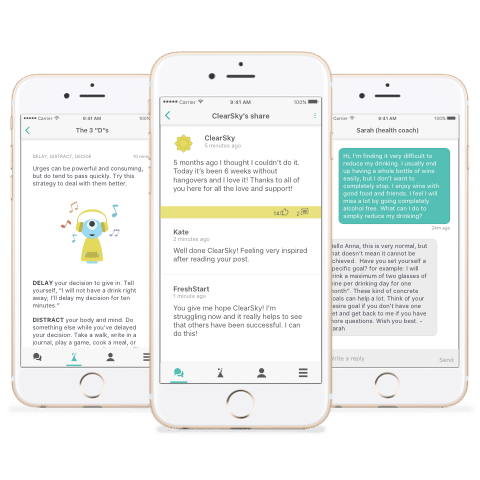As a health coach for Hello Sunday Morning’s app, Daybreak, I have noticed that anxiety is a really common issue for our members. For some people, it is a chicken or egg scenario – is my drinking a way that I am managing my anxiety, or is my anxiety partly a result of my drinking and all the things that come with it? And, where does stress fit into all of this? Is it the same, or separate to anxiety?
One thing I have noticed is that stress in our lives greatly increases our vulnerability to high-risk drinking, as well as being overwhelmed with strong emotions.
I wondered why that was, and what kind of relationship there was between these three factors. My sense was that if I, as a health coach, had these questions, our members might as well – so I have put together some pointers that my coaching clients have found helpful in exploring the relationship between anxiety, drinking, and stress.
What is anxiety?
Anxiety is a tricky thing to define but is generally our brain’s way of responding to some kind of threat – whether that is a threat to our safety, our reputation, our relationships or our sense of self. It can be affected by our genetics, our environment, and our personality. Stress is often a precursor to anxiety – stressful situations put us into ‘fight or flight’ mode that helps us to protect ourselves from various types of threat.
Can you be predisposed to anxiety?
There is a lot of evidence that links stressful life events (SLEs) in our early life with issues later in life, including anxiety, depression and, sometimes, substance use.
SLEs don’t have to be life or death situations – they can be things like witnessing parental divorce, economic adversity or mental illness. The evidence indicates that experiencing two or more SLEs in early life significantly increased a person’s chances of developing an issue with their mood, such as anxiety or depression.
Of course, if you are a child who is vulnerable to stress, you are probably going to be affected more by something like a divorce or economic hardship– which is where individual factors come in. An anxious or sensitive temperament and stress early on in life can create a ‘perfect storm’ for some issues later on down the track.
Not everyone who feels anxious as an adult has been exposed to SLEs, but there is a really strong relationship between SLEs and anxiety or depression. It is good to remember that the active component here is the ‘stress’ – when kids are exposed to ongoing stress in their lives, it impacts how their brains develop and respond to threats in their environment. But more on that later on.
A good thing to remember is that SLEs in adulthood can also create issues with our moods – if we have a number of stressful events with little opportunity for respite, we can find that it is much harder to keep positive.
Perhaps we start to feel really anxious after a bad breakup that just keeps going on, or very down and helpless after some chronic stress at work. Our brains don’t deal with ongoing stress well, particularly the kind of stress that we feel we can’t do much about.
Remember – stress often comes first, and if it keeps going, that is when problems can develop. Often when we look back to difficult times in our lives, we can see that a number of different stressors led up to it.
What is the science behind this? It sounds too ‘tell me about your childhood’!
Emotions and stress levels
There is a lot of research into SLEs, as well as the actual mechanism that creates this relationship between our exposure to stress, our moods, and our relationships with alcohol. Not surprisingly, there is a lot of heavy duty neuroscience, but essentially:
We know that SLEs can change how our brains develop and even which genes are expressed; in particular, in the dopamine reward pathway which is a major player in high-risk drinking.
Research has found major disruptions in our dopamine signalling (for motivated behaviour and reward seeking) associated with SLEs. The part of our brain that controls this system also affects our stress and anxiety levels.
Throughout our lifetime, stress causes us to produce cortisol which helps us to survive and stay alert. However, when these stress responses are activated over and over again, a person can become vulnerable to later problems with anxiety and depression.

One way to think about it is like a button that gets pressed over and over again. At first, it works well, but over time it wears out. Sometimes it will get stuck in the ‘on’ position, and other times it won’t work at all and we’ll need to keep pressing it until it does.
People who have some problems with regulating their emotions as adults will often have had lots of stressful experiences as children, which have caused them to become ‘dysregulated’. The button in their brain that controls anxiety, mood, and even motivation, has been pressed too much and is now worn out. They might need to drink lots of coffee to get going, or they might need to drink a lot of alcohol to calm themselves down.
If there have been many disruptive, challenging or stressful events in your childhood, this may have contributed to you experiencing some issues with anxiety as an adult. If you were an anxious child who experienced a lot of things as stressful, that may also be impacting you now. If you’ve just come through a number of stressors and are finding that your emotions are all over the place, this may also be something to consider.
How does this button fit in with my drinking?
It becomes even trickier as the way that alcohol works is by taking advantage of this ‘worn out’ stress button. People who fit this description may be more susceptible to the ‘pleasure’ pathway that occurs with alcohol.
Exposure to ongoing stress means that our brains produce less dopamine over time, and so we can feel flat and empty – which can cause us to seek out the ‘high’ of alcohol or drugs. Having a sip of alcohol sends excitatory projections to our nucleus accumbens, part of our reward pathway. A complex set of interactions occur which result in that ‘good’ feeling we can get from drinking, and in people who are vulnerable, it can be a really intense and rewarding experience.
In particular, if you are an anxious person who is under stress, you may be existing in a state of mild discomfort. It is not a comfortable feeling to be on edge or tense, and alcohol is something that significantly shifts that, really quickly. We become conditioned to believe that this is perhaps the only way to take away the discomfort, or relive the stress we are feeling – and so drinking becomes more and more of a coping strategy, particularly when we are having a difficult time in our lives and are stressed, burnt out or unhappy.
Perhaps at the beginning it is about having pleasure and getting enjoyment, and later on it may become about taking away unpleasant emotions and discomfort from not having the alcohol – which is a good indicator that a problem is starting to develop, and some support is needed.
But where does this leave me?
This may sound really bleak, but don’t worry! The good news is that being aware of this relationship is a big part of the solution. Daybreak members who have identified this link between stress, anxiety, and drinking, have found some of the following strategies really helpful:
• Talk to a counsellor or coach about what kinds of things are generally stressful for you like relationship problems, criticism, failure or rejection. Understanding your triggers means that they are no longer triggers, but rather situations which can be handled with care and understanding.
• Finding other ways to ‘self-soothe’. Things like relaxation and exercise are effective ways of lowering physiological arousal and increasing your production of dopamine. Importantly, they also give us a sense of control over our mood state, which is really important for our wellbeing.
• Find ways to reduce stress in your life. If your stress button has been ‘worn out’ by life events, it may be necessary to find ways to deal with stress differently, whether that involves a change in your self-care, seeking support from friends and family to help lighten the load, or problem solving ways to address sources of ongoing stress.
• Make a list of trigger situations and a plan to deal with each of these. For example, if you know that you are likely to feel depleted and exhausted after work, make a plan to go for a walk with a friend, or schedule some other self-soothing activity that will be effective in lowering your arousal.
During these times that we are under stress in our adult lives, we need to be even more careful with things like alcohol and ensure that we are looking after ourselves and keeping stress to a minimum. This might involve getting some counselling to help deal with the source of strong emotions, or even to help to resolve current stresses in our relationships, work life or friendships.



